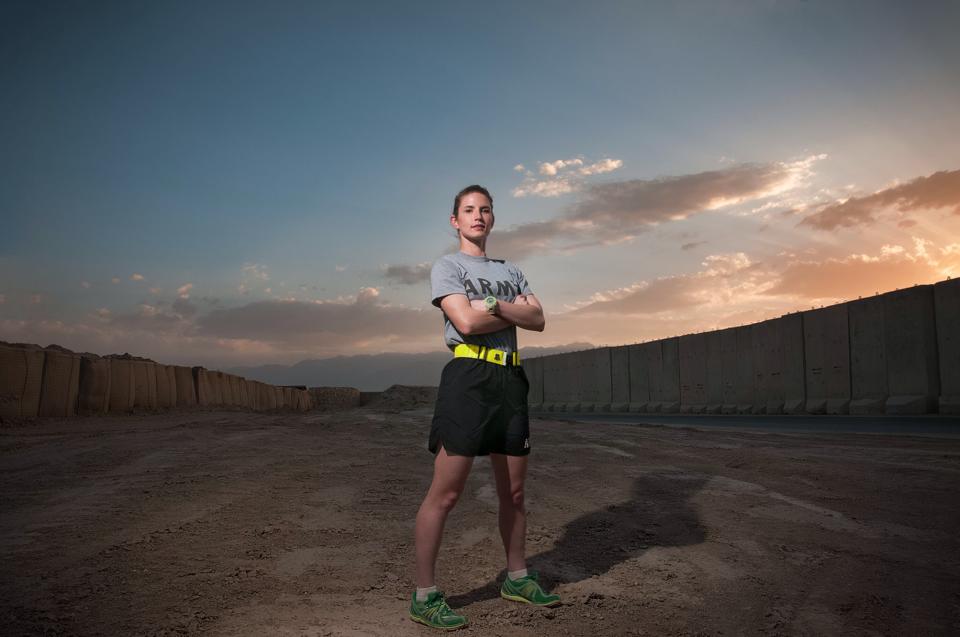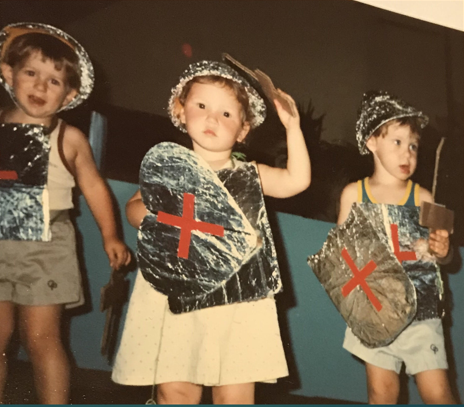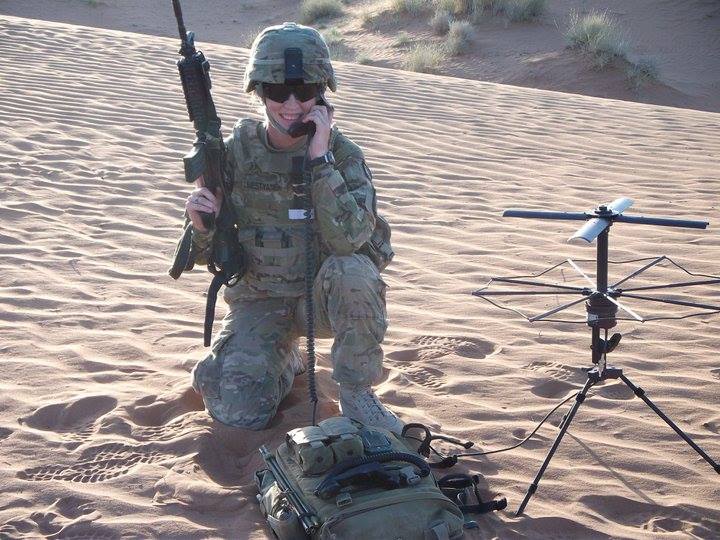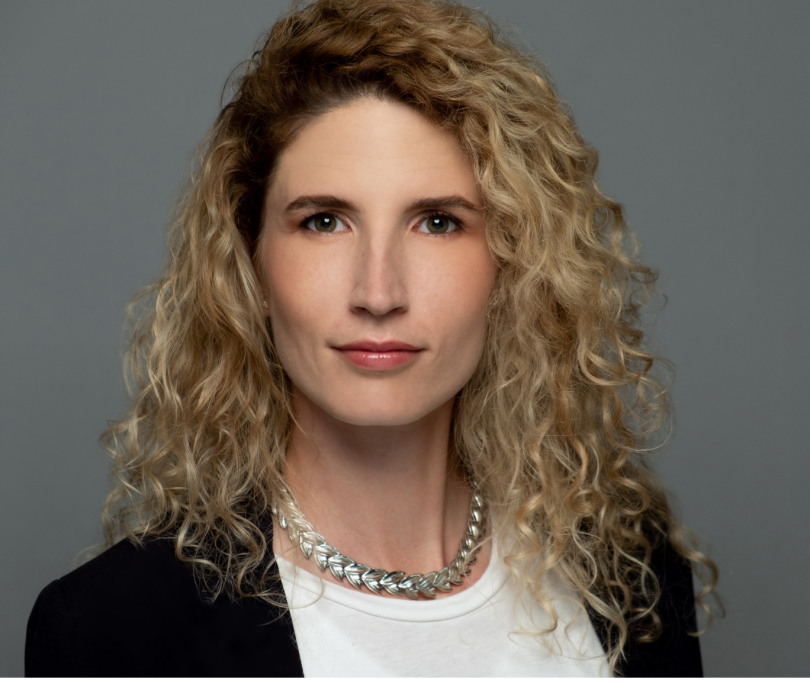In Search of Myself: Surviving a Cult and Blazing Trails
By: Jeff Joiner | March 14, 2023

Wearing a heavy, ill-fitting Kevlar armor vest over her fatigues and carrying an M4 rifle, ammunition and other gear, 1st Lt. Daniella Mestyanek Young BA’12 accompanied a U.S. Army combat patrol approaching a village in Afghanistan’s Kandahar Province in 2011. Young and 25 Army Pathfinders were about to enter the village to meet with local leaders, but Young couldn’t shake the feeling that something was wrong.
“ … With each step toward the village, my heart tightened,” Young later wrote in a memoir. “Then it hit me: Where were all the children? … I scrambled to connect the dots. Suddenly, like the flash of a bomb, there it was. ‘Stop!’ I said.”
Young loved seeing village children during her overseas deployments. In her recently published book “Uncultured,” Young describes Afghan girls – “6-year-old girls toting baby siblings on their hips” – who reminded her why they were fighting in Afghanistan. They also reminded Young of her own traumatic childhood in a religious cult – “a version of the childhood I’d survived: hungry faces … calloused bare feet and the fear hiding behind their eyes.”
In 2011, Young was one of the first American female soldiers in the Afghanistan War to join combat patrols as part of a cultural outreach to Afghan women and children. But as an intelligence officer trained to recognized enemy behavior, she realized the danger her patrol faced that day. Absent village children told Young the Americans were the likely target of an attack. In this case, by a bomb planted in the path leading to the village. The threat bypassed, it marked another moment in Young’s traumatic young life, both as a trailblazing female Army officer and a child growing up with abuse, where fear dominated daily existence.
The Beginnings
Young was born in 1987, the daughter of members of the Children of God cult living in a commune in the Philippines. David Berg, a former minister who called himself “the Prophet,” founded the group a decade earlier, attracting dissatisfied counterculture hippies. After facing backlash in the U.S., Berg and his followers fled the country and planted the seeds of the supposed Christian movement around the world in secretive compounds that by the mid-1970s had grown to more than 10,000 members in 15 countries.
Members of the group, “The Family” as they called themselves “forsook their worldly possessions and dedicated their lives to Jesus, as explained by the Prophet,” Young wrote. Life in The Family included a fierce paranoia of the outside world and constant preparation for the apocalypse.

Over time, Berg’s ministry and doctrines became sexualized as he taught that carnal relations among members was a way to demonstrate God’s love. The practices involved not only adults but also children, Young explained in her memoir.
“(Women) served at the feet of men … ,” wrote Young, who was sexually abused by a cult leader at age 6 and whose mother became pregnant at 14.
Raised in communal nurseries while living in children’s barracks in Children of God communes in Japan, Peru and Brazil, Young and other kids were frequently beaten when accused of breaking Family rules. One punishment involved standing still for long periods of time while holding a Bible in their outstretched arms. If they moved, they were hit.
The Other Side
At 14, Young fled a commune in Mexico to live in Houston with an older stepsister who had also escaped The Family. Young had been taught to read by her mother who quietly supplied her with secular children’s books that she voraciously read, but otherwise Young had only the barest education. Studious and passionate for learning about the outside world, Young graduated from high school in Houston in 2005 while working full time.
As a young girl, Young could only dream of life beyond the commune walls. Now she was living it, and an education was her ticket to freedom. She applied and was accepted to attend The University of Texas at Dallas.
But life was not easy outside the Children of God – Young’s only frame of reference until she fled. Both in high school and at UTD she had difficulties finding her identity in a strange world she had been taught only wanted to harm her and where she lived in constant fear of others discovering her past.
At UT Dallas, Young excelled in her studies. She majored in literature in the School of Arts and Humanities, but developing a social life was awkward until she met members of the University’s chess team. Young felt she had finally found her group in the bookish students who famously dominated collegiate chess competitions around the country.
With a high GPA and with the University wanting to form a women’s chess team, Young was invited to join the group even though she had only recently learned the game. She describes herself as the one and only “walk-on” member of the UTD chess team.
“For me, UTD was where I went to reinvent myself,” she said. “In every group I was used to being the weird one, the one that stands out with the weirdest stories. So, all of a sudden, I’m hanging out with the chess team, and it was the first time I didn’t feel so weird – that I felt like I fit.”
A Time of Service
Young graduated from UT Dallas in 2008 and facing the question of what to do next joined the Army where, following basic training, she graduated from Officer Candidate School. Nearly a decade removed from her life in the Children of God, it didn’t take long for the similarities between life in the military and in a cult to become obvious to her.
“In basic training, I started having flashbacks to the cult, but especially when I deployed,” she said. “I understood that there’s going to be parallels between God’s army and Uncle Sam’s army, but I wasn’t prepared for getting my freedom only to find myself in Afghanistan in another compound surrounded by walls.”

Young deployed to Afghanistan twice – in 2011 and 2014 – with the Army’s 101st Division as an intelligence officer. During her first deployment, she volunteered to join fellow female soldiers as part of Army Female Engagement Teams who accompanied combat patrols in the countryside to meet and interact with Afghan women and their families, something male soldiers were prohibited from doing. Young and 42 others were the first women in deliberate combat roles in the war.
But Young and other female soldiers experienced a strange standard in Afghanistan. The women carried weapons and were expected to use them if attacked, but they received no combat training and even the Kevlar vests issued to female soldiers were meant for men. In Young’s case, her large vest didn’t fit her 100-pound frame, making it dangerous for her to wear.
Female soldiers – especially officers – were also faced with regulations to control fraternization with male soldiers that placed an unreasonable burden on women to avoid nearly all contact with their male counterparts for fear of attracting attention and even damaging their military careers. In Young’s case, friendship with a private contractor on her Afghan base resulted in her being sexually assaulted and powerless to seek justice without ending her career.
“Being a female officer is the loneliest job on the planet,” Young said.
Moving Forward
After retiring from the Army as a captain and receiving a Volunteer Service Award from President Barack Obama, Young decided to write a book about her life, focused on growing up in an abusive cult and serving in the wartime military. “Uncultured” was written as the story of a child and a woman struggling to find an identity in two worlds where identities are crushed to serve the institution.
“Could I recover from the life I had lived? From the cults I kept joining? From never having learned to be myself?” Young asked in her memoir.
Young said she is proud of her groundbreaking military service in the war and feels she and her fellow female soldiers played a part in creating a more positive environment for women in today’s military, though Young says there is much still to do.

She is now writing a second book to be called “The Culting of America,” which will examine the organizational psychology and group dynamics of extreme groups like cults, terrorists and even the leaderless group QAnon and why such groups are flourishing in the U.S.
“I want to show how this is possible in America and why this is the reason we are becoming so polarized,” Young said. “Humans evolved to join groups because it makes us stronger, but even if your group is amazing, you’re only 1% away from being a cult.”
Learn more about Young and her memoir.